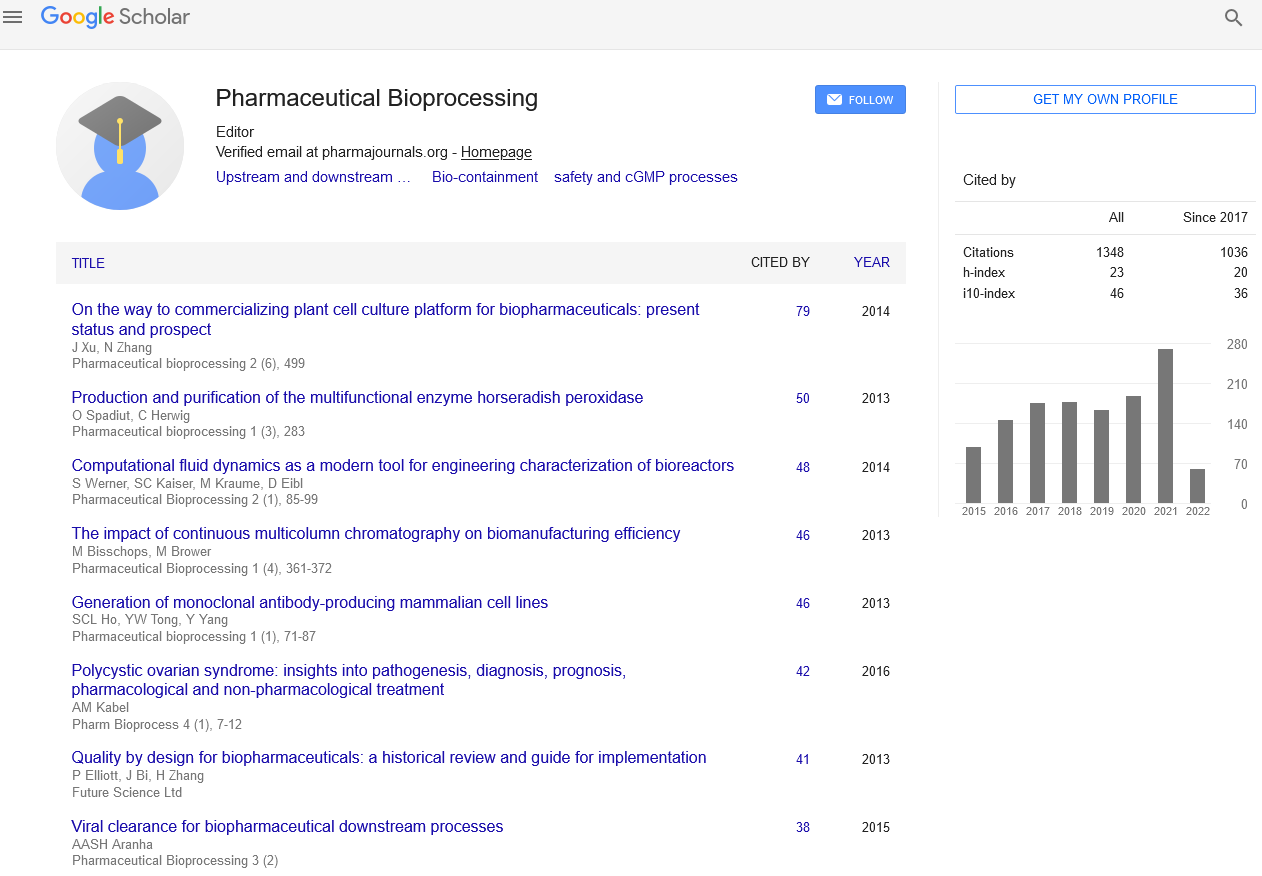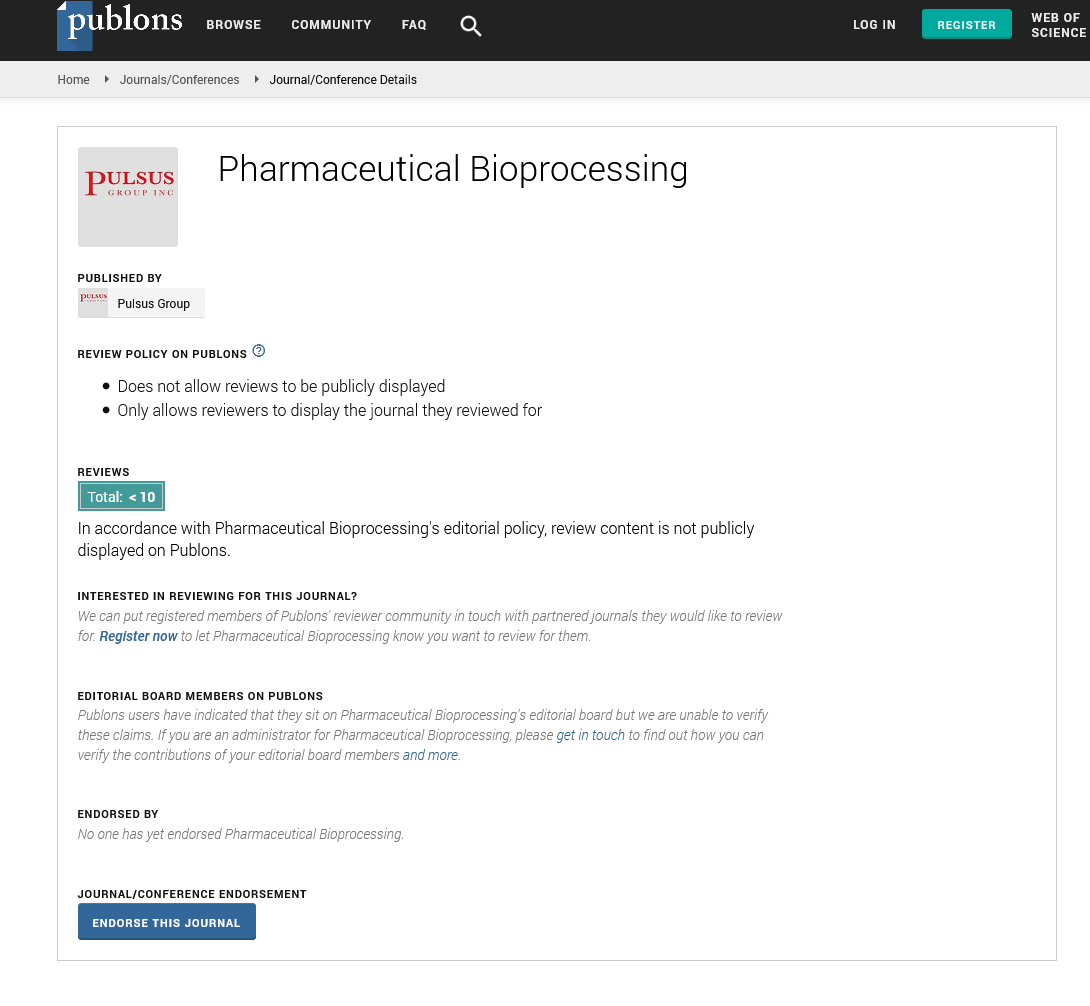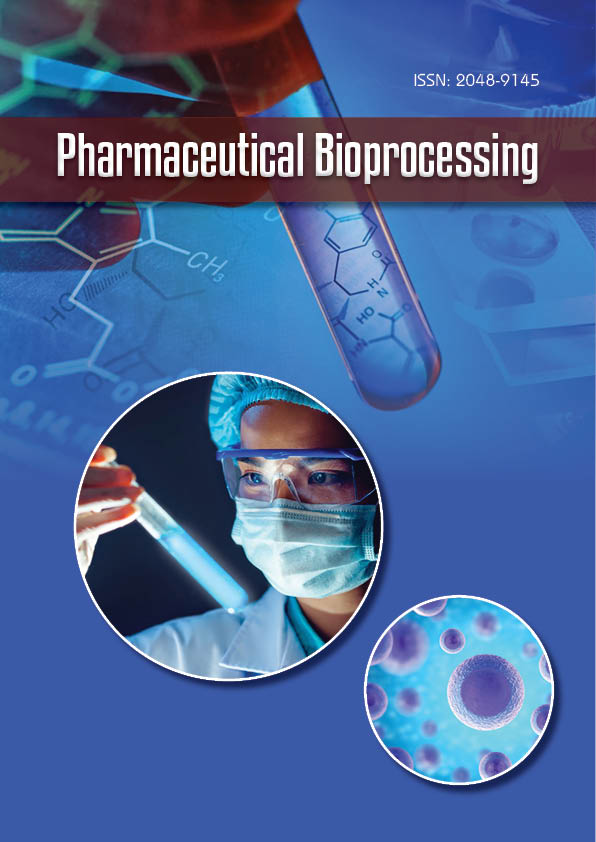Perspective - Pharmaceutical Bioprocessing (2023) Volume 11, Issue 6
The Evolution of Pharmaceuticals: Advancements, Challenges, and the Future of Healthcare
- Corresponding Author:
- Herbert Dichtel
Department of Pharmacy,
Biotech Pharmaceutical Center,
Boca Raton,
United States
E-mail: herbert_dichtel@biotest.de
Received: 13-Nov-2023, Manuscript No. FMPB-23-120752; Editor assigned: 17-Nov-2023, PreQC No. FMPB-23-120752 (PQ); Reviewed: 01-Dec-2023, QC No. FMPB-23-120752; Revised: 18-Dec-2023, Manuscript No. FMPB-23-120752 (R); Published: 26-Dec-2023, DOI: 10.37532/2048-9145.2023.11(6).122-123
Introduction
The pharmaceutical industry stands at the forefront of modern healthcare, playing a pivotal role in the development, production, and distribution of medications that improve and save lives. Over the years, pharmaceuticals have evolved from simple remedies to complex formulations, incorporating cutting-edge technologies and scientific breakthroughs. This article explores the journey of the pharmaceutical industry, highlighting key advancements, current challenges, and the promising future that lies ahead.
Description
Historical perspective
The roots of pharmaceuticals can be traced back to ancient civilizations where herbal remedies and natural substances were used to treat various ailments. As time progressed, the field of pharmacology emerged, paving the way for the systematic study of drugs and their effects on the human body. The 19th and 20th centuries witnessed significant milestones, such as the discovery of antibiotics, which revolutionized the treatment of infectious diseases.
Advancements in drug discovery and development
The pharmaceutical industry has seen remarkable progress in drug discovery and development. Advances in molecular biology, genomics, and bioinformatics have accelerated the identification of potential drug targets. High-throughput screening and computational modeling techniques have streamlined the process of identifying lead compounds, allowing researchers to explore a vast array of chemical entities efficiently.
The advent of biotechnology has opened new frontiers in drug development, with the creation of biopharmaceuticals such as monoclonal antibodies and recombinant proteins. These bioengineered drugs offer targeted and personalized treatment options for various diseases, including cancer, autoimmune disorders and infectious diseases. The development of mRNA-based vaccines, exemplified by the rapid creation of COVID-19 vaccines, showcases the transformative power of biotechnology in responding to global health challenges.
Precision medicine and personalized therapies
One of the most significant shifts in the pharmaceutical landscape is the move towards precision medicine. Instead of adopting a one-size-fits-all approach, precision medicine tailors treatments to individual patients based on their genetic, environmental, and lifestyle factors. Advances in genomics have allowed researchers to unravel the genetic basis of diseases, enabling the development of targeted therapies that address the specific molecular mechanisms underlying each patient’s condition. Immunotherapy, a groundbreaking approach in cancer treatment, exemplifies the move towards personalized medicine. By harnessing the body’s immune system to target and destroy cancer cells, immunotherapies have demonstrated remarkable success in certain cancers, offering new hope to patients with previously limited treatment options.
Challenges facing the pharmaceutical industry
Despite its many successes, the pharmaceutical industry faces several challenges that impact its ability to innovate and deliver transformative therapies.
Regulatory hurdles: The regulatory approval process for new drugs is lengthy and complex. Stringent requirements, extensive clinical trials, and evolving regulatory standards contribute to the time and cost associated with bringing a new drug to market.
Drug pricing and access: The high cost of pharmaceuticals and concerns about accessibility have become pressing issues. Striking a balance between recouping research and development costs and ensuring affordable access to life-saving medications remains a delicate challenge.
Drug resistance: The emergence of drugresistant strains of bacteria and viruses poses a threat to public health. Antimicrobial resistance, in particular, is a growing concern that requires concerted efforts to develop new antibiotics and alternative treatment strategies.
Research and development costs: The cost of bringing a new drug to market is exorbitant, with estimates reaching billions of dollars. Balancing the need for profitability with the ethical imperative to make life-saving treatments accessible is an ongoing challenge for pharmaceutical companies.
Future directions and innovations
As the pharmaceutical industry confronts challenges, it also embraces new opportunities and innovations that promise to reshape the future of healthcare.
Digital health and artificial intelligence: The integration of digital health technologies and Artificial Intelligence (AI) is poised to revolutionize drug discovery, patient care, and treatment outcomes. AI algorithms can analyze vast datasets to identify potential drug candidates, predict patient responses, and optimize treatment plans.
CRISPR and gene editing: The revolutionary CRISPR-Cas9 gene-editing technology has the potential to address genetic disorders at their root. While ethical and safety considerations must be carefully navigated, gene editing holds promise for developing curative therapies for a wide range of genetic conditions.
Collaborative research models: Collaborative research models, involving partnerships between pharmaceutical companies, academic institutions, and government agencies, are becoming increasingly prevalent. These partnerships leverage diverse expertise and resources to accelerate the development of innovative therapies.
Patient-centric approaches: The shift towards patient-centric healthcare emphasizes involving patients in the drug development process. Patient advocacy groups, real-world evidence, and patient-reported outcomes contribute valuable insights that shape research priorities and ensure that drugs meet the needs of those they are intended to help.
Conclusion
The pharmaceutical industry has undergone a remarkable transformation, from the rudimentary remedies of ancient times to the sophisticated, targeted therapies of today. As science and technology continue to advance, the future promises even more groundbreaking innovations in drug discovery, development, and delivery. Challenges such as regulatory hurdles, drug pricing, and resistance must be addressed collaboratively to ensure that the benefits of pharmaceutical advancements are accessible to all. Ultimately, the pharmaceutical industry plays a vital role in shaping the trajectory of healthcare. Through continued research, innovation and a commitment to addressing global health challenges, the industry can contribute to a future where diseases are better understood, treatments are more effective, and patients experience improved quality of life.


